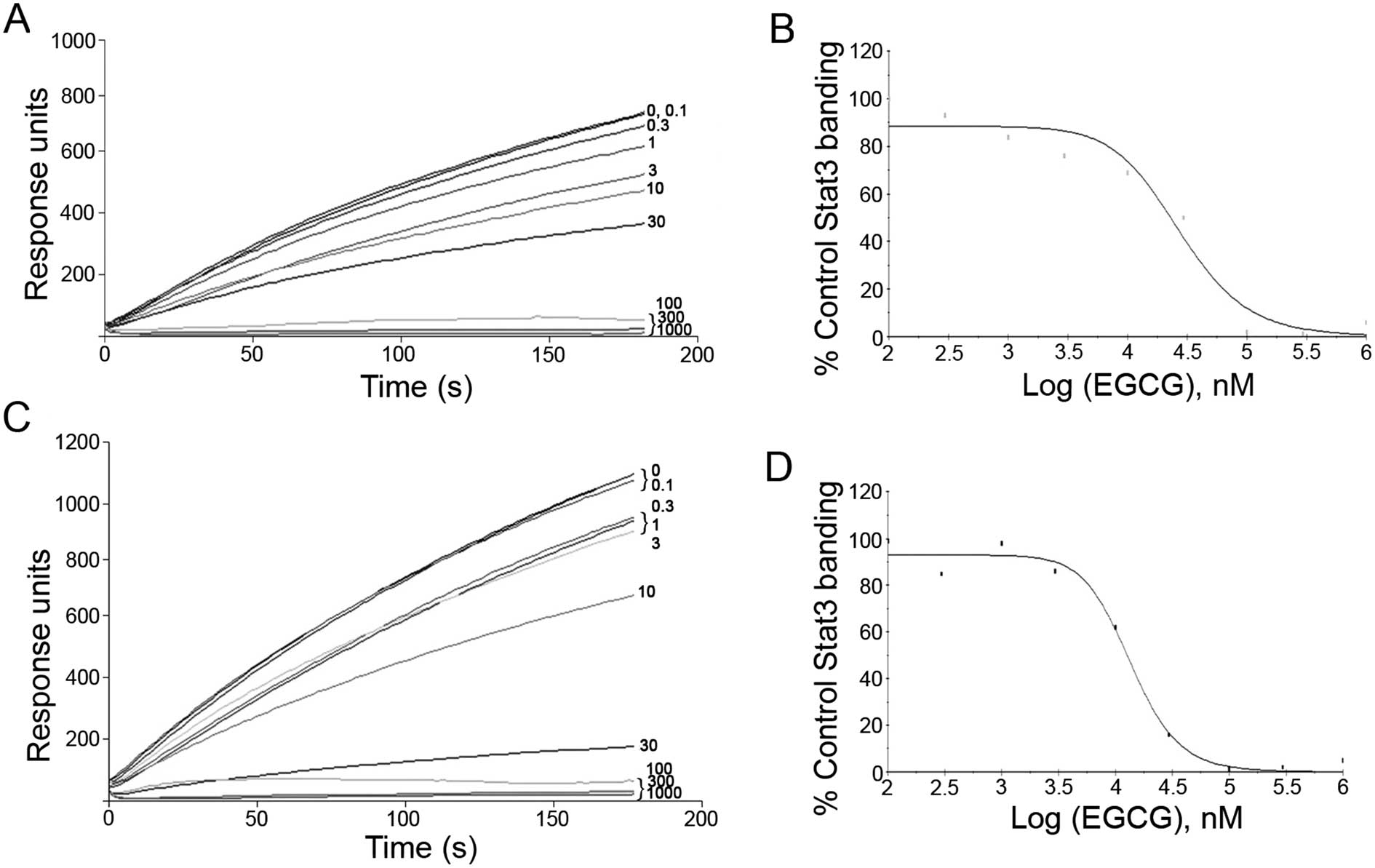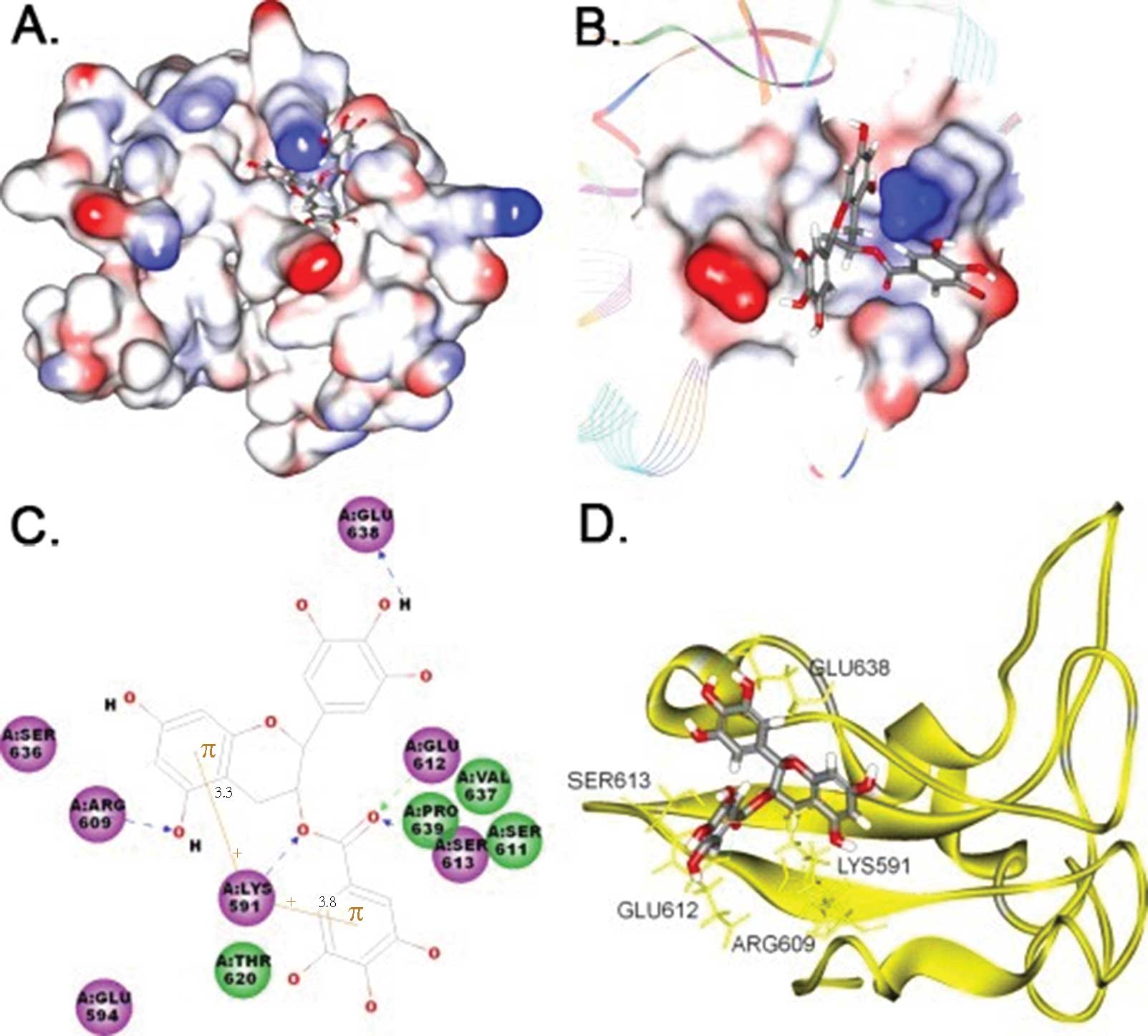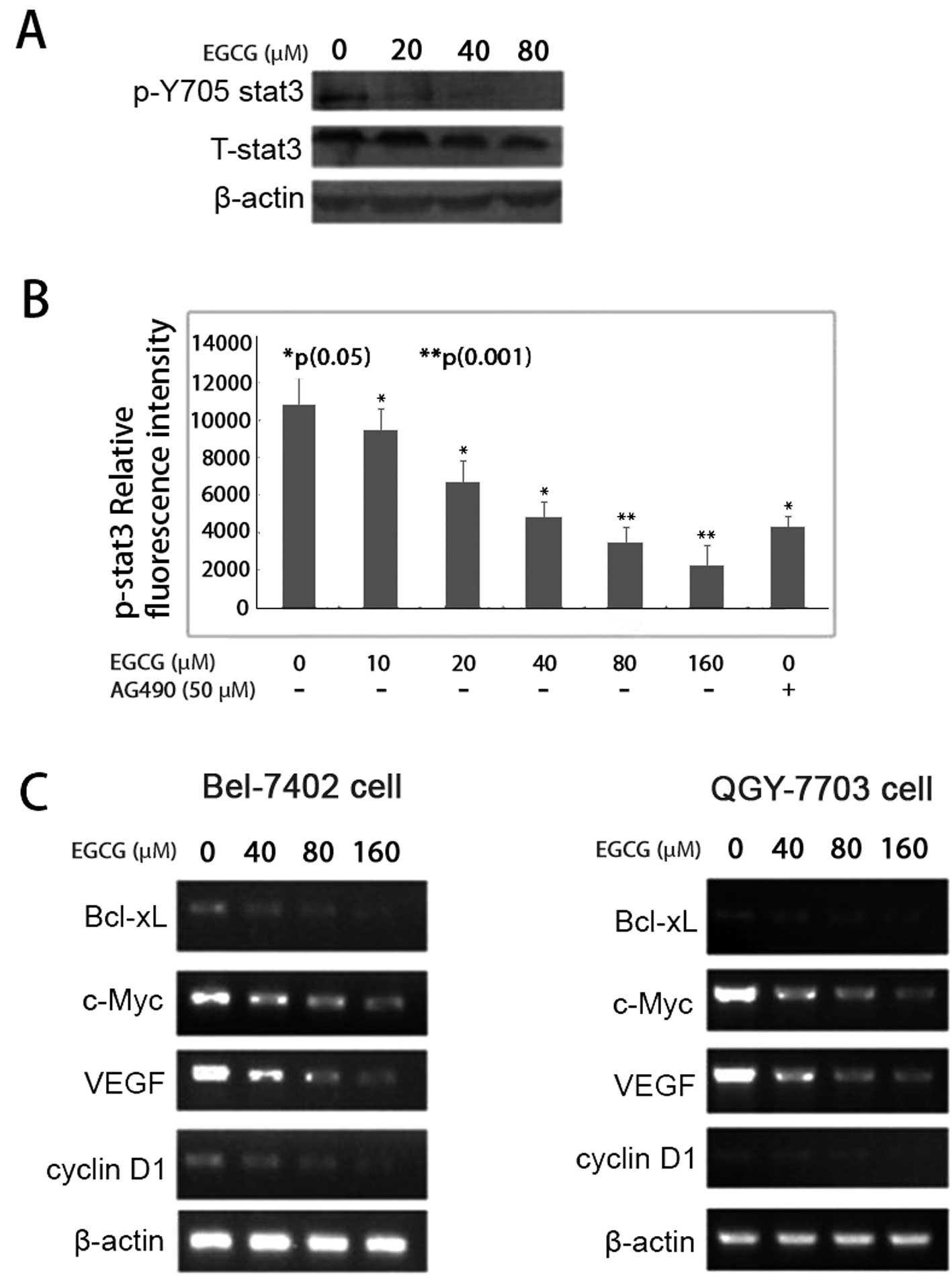|
1
|
Darnell JE Jr, Kerr IM and Stark GR:
Jak-STAT pathways and transcriptional activation in response to
IFNs and other extracellular signaling proteins. Science.
264:1415–1421. 1994. View Article : Google Scholar : PubMed/NCBI
|
|
2
|
Buettner R, Mora LB and Jove R: Activated
STAT signaling in human tumors provides novel molecular targets for
therapeutic intervention. Clin Cancer Res. 8:945–954.
2002.PubMed/NCBI
|
|
3
|
Aggarwal BB, Sethi G, Ahn KS, Sandur SK,
Pandey MK, Kunnumakkara AB, Sung B and Ichikawa H: Targeting
signal-transducer-and-activator-of-transcription-3 for prevention
and therapy of cancer: modern target but ancient solution. Ann NY
Acad Sci. 1091:151–169. 2006. View Article : Google Scholar : PubMed/NCBI
|
|
4
|
Redell MS and Tweardy DJ: Targeting
transcription factors in cancer: challenges and evolving
strategies. Drug Discov Today Technol. 3:261–267. 2006. View Article : Google Scholar : PubMed/NCBI
|
|
5
|
Whittaker S, Marais R and Zhu AX: The role
of signaling pathways in the development and treatment of
hepatocellular carcinoma. Oncogene. 29:4989–5005. 2010. View Article : Google Scholar : PubMed/NCBI
|
|
6
|
Berishaj M, Gao SP, Ahmed S, Leslie K,
Al-Ahmadie H, Gerald WL, Bornmann W and Bromberg JF: Stat3 is
tyrosine-phosphorylated through the interleukin-6/glycoprotein
130/Janus kinase pathway in breast cancer. Breast Cancer Res.
9:R322007. View
Article : Google Scholar : PubMed/NCBI
|
|
7
|
Lin L, Amin R, Gallicano GI, Glasgow E,
Jogunoori W, Jessup JM, Zasloff M, Marshall JL, Shetty K, Johnson
L, Mishra L and He AR: The STAT3 inhibitor NSC 74859 is effective
in hepatocellular cancers with disrupted TGF-β signaling. Oncogene.
28:961–972. 2009.PubMed/NCBI
|
|
8
|
Soresi M, Giannitrapani L, D’Antona F,
Florena AM, La Spada E, Terranova A, Cervello M, D’Alessandro N and
Montalto G: Interleukin-6 and its soluble receptor in patients with
liver cirrhosis and hepatocellular carcinoma. World J
Gastroenterol. 12:2563–2568. 2006.PubMed/NCBI
|
|
9
|
Berasin C, Castillo J, Perugorria MJ,
Latasa MU, Prieto J and Avila MA: Inflammation and liver cancer:
new molecular links. Ann NY Acad Sci. 1155:206–221. 2009.
View Article : Google Scholar : PubMed/NCBI
|
|
10
|
Calvisi DF, Ladu S, Gorden A, Farina M,
Conner EA, Lee JS, Factor VM and Thorgeirsson SS: Ubiquitous
activation of Ras and Jak/Stat pathways in human HCC.
Gastroenterology. 130:1117–1128. 2006. View Article : Google Scholar : PubMed/NCBI
|
|
11
|
To KF, Chan MW, Leung WK, Ng EK, Yu J, Bai
AH, Lo AW, Chu SH, Tong JH, Lo KW, Sung JJ and Chan FK:
Constitutional activation of IL-6-mediated JAK/STAT pathway through
hypermethylation of SOCS-1 in human gastric cancer cell line. Br J
Cancer. 91:1335–1341. 2004. View Article : Google Scholar : PubMed/NCBI
|
|
12
|
Li HC, Yashiki S, Sonoda J, Lou H, Ghosh
SK, Byrnes JJ, Lema C, Fujiyoshi T, Karasuyama M and Sonoda S:
Green tea polyphenoles induce apoptosis in vitro in peripheral
blood T lymphocytes of adult T-cell leukemia patients. Jpn J Cancer
Res. 91:34–40. 2000. View Article : Google Scholar : PubMed/NCBI
|
|
13
|
Park G, Yoon BS, Moon JH, Kim B, Jun EK,
Oh S, Kim H, Song HJ, Noh JY, Oh C and You S: Green tea polyphenol
epigallocatechin-3-gallate suppresses collagen production and
proliferation in keloid fibroblasts via inhibition of the
STAT3-signaling pathway. J Invest Dermatol. 128:2429–2441. 2008.
View Article : Google Scholar : PubMed/NCBI
|
|
14
|
Ahn HY, Hadizadeh KR, Seul C, Yun YP,
Vetter H and Sachinidis A: Epigallocathechin-3 gallate selectively
inhibits the PDGF-BB-induced intracellular signaling transduction
pathway in vascular smooth muscle cells and inhibits transformation
of sis-transfected NIH 3T3 fibroblasts and human glioblastoma
cells. Mol Biol Cell. 10:1093–1104. 1999. View Article : Google Scholar
|
|
15
|
Xu X, Kasembeli MM, Jiang X, Tweardy BJ
and Tweardy DJ: Chemical probes that competitively and selectively
inhibit Stat3 activation. PLoS One. 4:e47832009. View Article : Google Scholar : PubMed/NCBI
|
|
16
|
Kasembeli MM, Xu X and Tweardy DJ: SH2
domain binding to phosphopeptide ligands: potential for drug
targeting. Front Biosci. 14:1010–1022. 2009. View Article : Google Scholar : PubMed/NCBI
|
|
17
|
Shao H, Xu X, Jing N and Tweardy DJ:
Unique structural determinants for Stat3 recruitment and activation
by the granulocyte colony-stimulating factor receptor at
phosphotyrosine ligands 704 and 744. J Immunol. 176:2933–2941.
2006. View Article : Google Scholar : PubMed/NCBI
|
|
18
|
Shao H, Xu X, Mastrangelo MA, Jing N, Cook
RG, Legge GB and Tweardy DJ: Structural requirements for signal
transducer and activator of transcription 3 binding to
phosphotyrosine ligands containing the YXXQ motif. J Biol Chem.
279:18967–18973. 2004. View Article : Google Scholar : PubMed/NCBI
|
|
19
|
Takada M, Nakamura Y, Koizumi T, Toyama H,
Kamigaki T, Suzuki Y, Takeyama Y and Kuroda Y: Suppression of human
pancreatic carcinoma cell growth and invasion by
epigallocatechin-3-gallate. Pancreas. 25:45–48. 2002. View Article : Google Scholar : PubMed/NCBI
|
|
20
|
Zhu B, Chen H, Zhan W, Wang CY, Cai SR,
Wang Z, Zhang CH and He YL: (−)-Epigallocatechin-3-gallate inhibits
VEGF expression induced by IL-6 via Stat3 in gastric cancer. World
J Gastroenterol. 7:2315–2325. 2011.
|
|
21
|
Yang GY, Liao J, Kim K, Yurkow EJ and Yang
CS: Inhibition of growth and induction of apoptosis in human cancer
cell lines by tea polyphenols. Carcinogenesis. 19:611–616. 1998.
View Article : Google Scholar : PubMed/NCBI
|
|
22
|
Yang CS, Lambert JD, Hou Z, Ju J, Lu G and
Hao X: Molecular targets for the cancer preventive activity of tea
polyphenols. Mol Carcinog. 45:431–435. 2006. View Article : Google Scholar : PubMed/NCBI
|
|
23
|
Shankar S, Suthakar G and Srivastava RK:
Epigallocatechin-3-gallate inhibits cell cycle and induces
apoptosis in pancreatic cancer. Front Biosci. 12:5039–5051. 2007.
View Article : Google Scholar : PubMed/NCBI
|


















